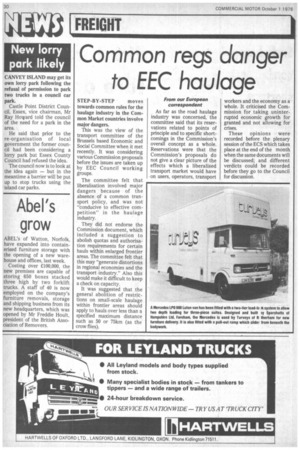Common regs danger to EEC haulage
Page 32

If you've noticed an error in this article please click here to report it so we can fix it.
STEP-BY-STEP moves towards common rules for the haulage industry in the Common Market countries involve major dangers.
This was the view of the transport committee of the Brussels based Economic and Social Committee when it met recently. It was considering various Commission proposals before the issues are taken up by EEC Council working groups.
The committee felt that liberalisation involved major dangers because of the absence of a common transport policy, and was not "conducive to effective competition" in the haulage industry.
They did not endorse the Commission document, which included a suggestion to abolish quotas and authorisation requirements for certain hauls within enlarged frontier areas. The committee felt that this may "generate distortions in regional economies and the transport industry." Also this would make it difficult to keep a check on capacity.
It was suggested that the general abolition of restrictions on small-scale haulage within frontier areas should apply to hauls over less than a specified maximum distance such as 50 or 75krn (as the crow flies).
From our European correspondent
As far as the road haulage industry was concerned, the committee said that its reservations related to points of principle and to specific shortcomings in the Commission's overall concept as a whole. Reservations were that the Commission's proposals do not give a clear picture of the effects which a liberalised transport market would have on users, operators, transport workers and the economy as a whole. It criticised the Commission for taking uninterrupted economic growth for granted and not allowing for crises.
These opinions were recorded before the plenary session of the ECS which takes place at the end of the month when the same documents will be discussed; and different verdicts could be recorded before they go to the Council for discussion.




































































































































































